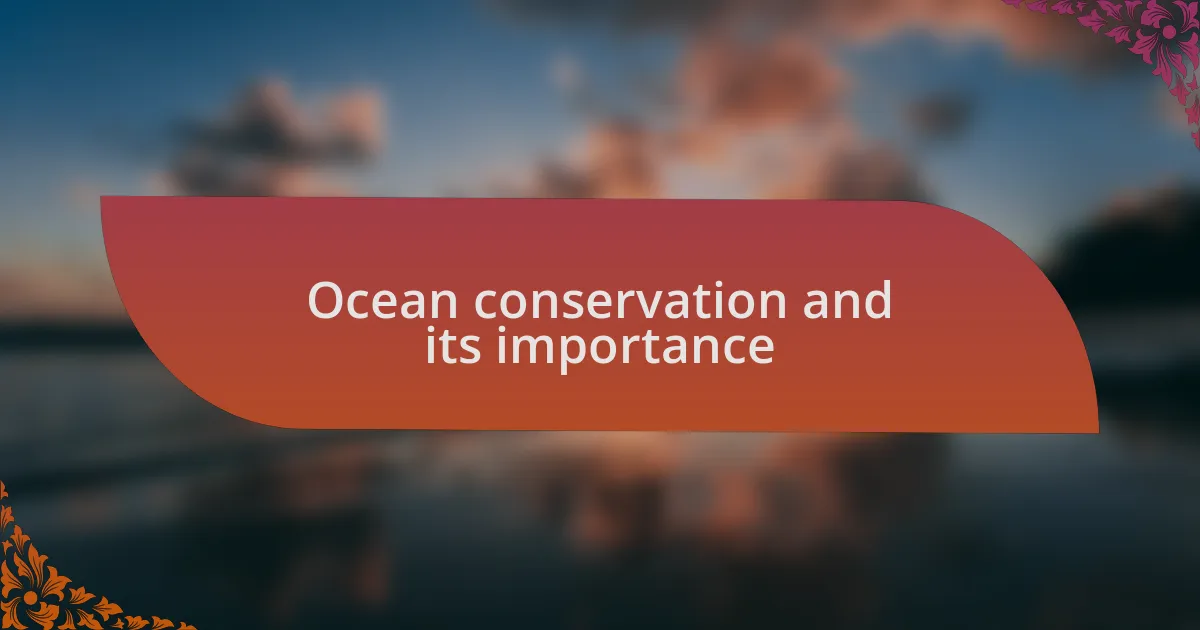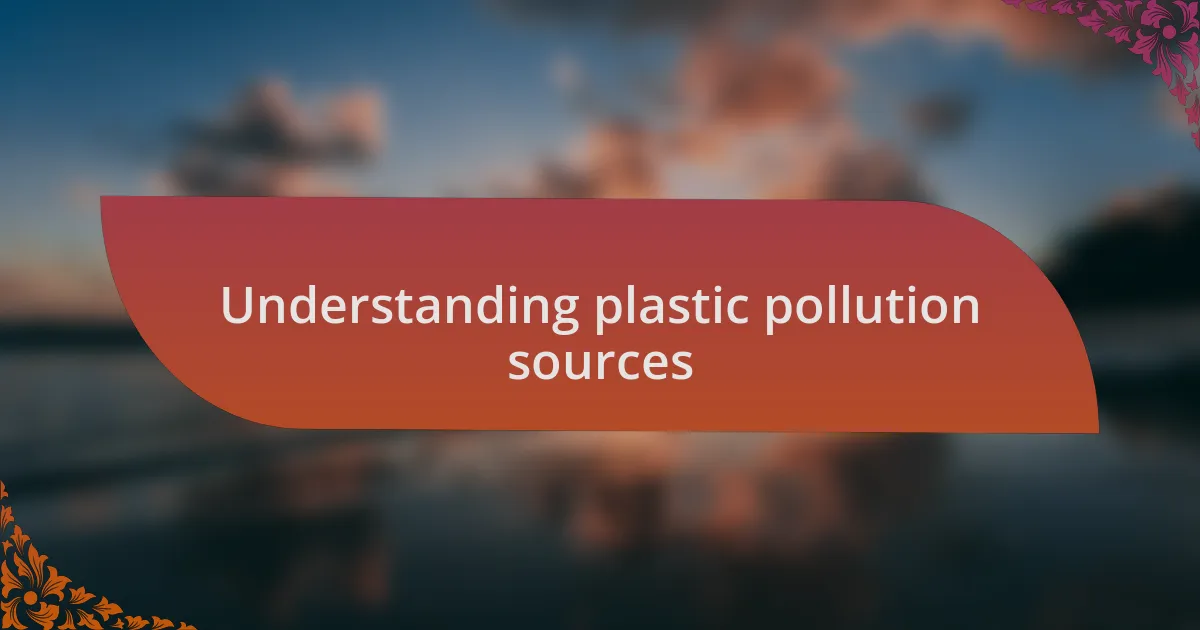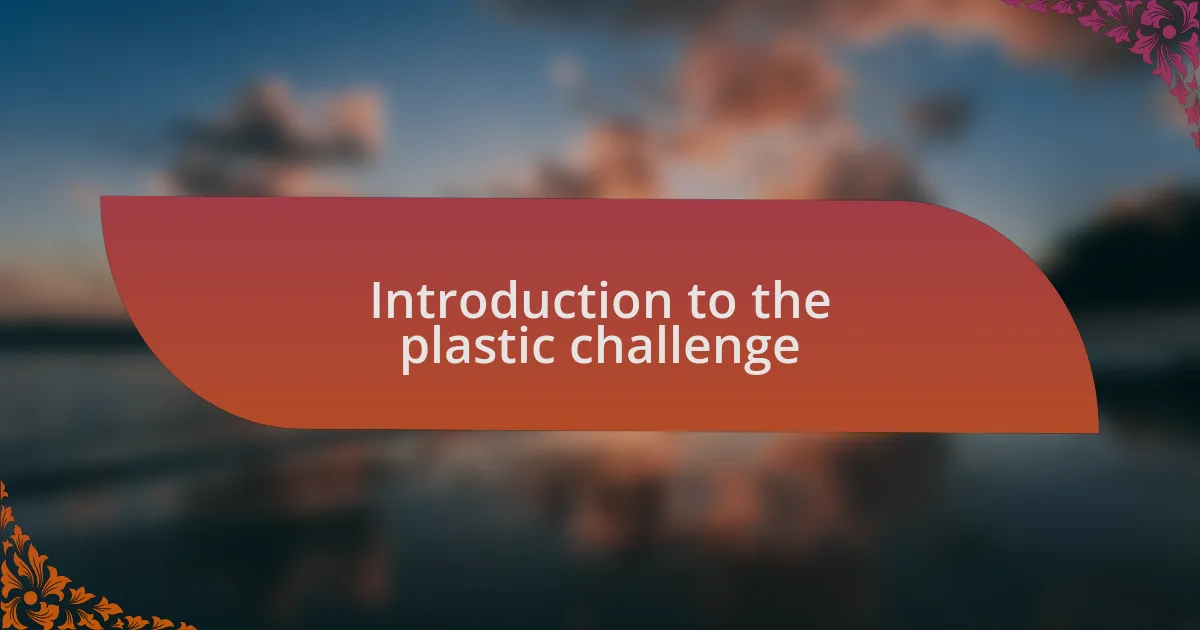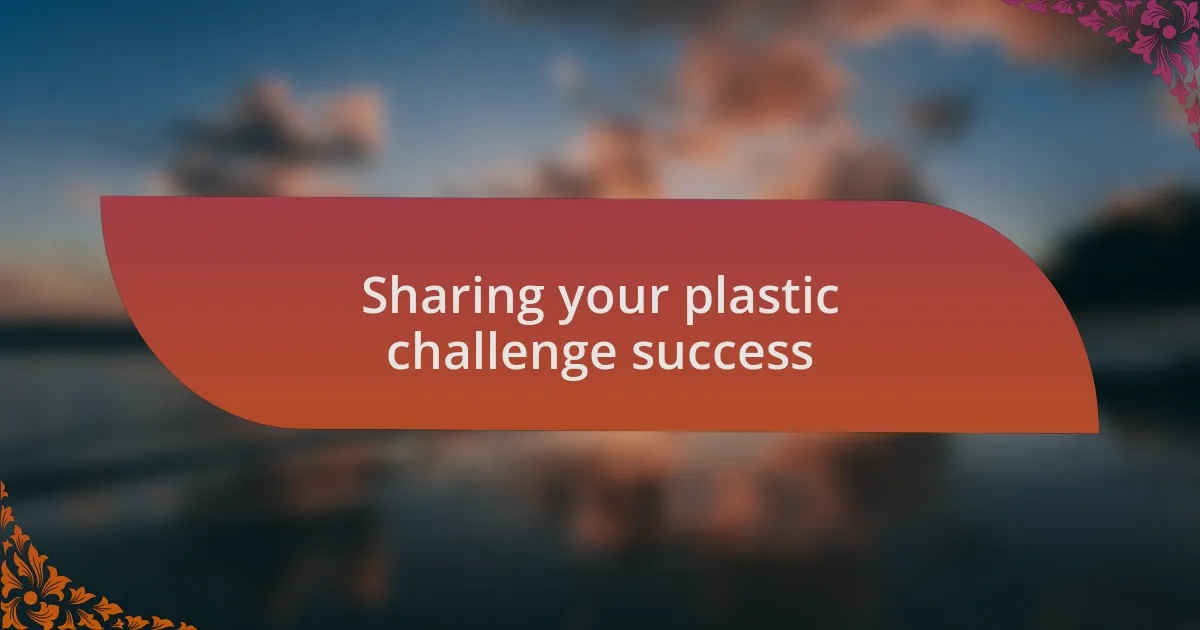Key takeaways:
- Ocean conservation is crucial as human activities threaten marine ecosystems through pollution and overfishing, emphasizing our responsibility to protect these resources.
- Plastic pollution stems from single-use plastics, industrial negligence, and personal habits, highlighting the need for conscious consumer choices to reduce marine waste.
- The Plastic Challenge encourages individuals to reduce plastic use, fostering community support and awareness about the impact of personal consumption on the environment.
- Sharing successes and struggles related to the Plastic Challenge can inspire collective action and foster deeper conversations around environmental responsibility.

Ocean conservation and its importance
I’ve always felt a deep connection to the ocean, feeling its vastness and mystery every time I step foot on a beach. This personal connection drives home the importance of ocean conservation, as our seas face threats from pollution, overfishing, and climate change. Wouldn’t it be heartbreaking to witness the death of coral reefs, which play such a crucial role in marine ecosystems?
The ocean is often called the lungs of our planet, producing more than half of the oxygen we breathe. Reflecting on the times I’ve marveled at the beauty of marine life, it pains me to think about how human activities disrupt these delicate ecosystems. When I consider how much joy a simple walk along the shoreline brings, I realize we have a responsibility to protect these treasures for future generations.
Moreover, every little action counts in our conservation efforts. It’s easy to feel overwhelmed or insignificant, yet I remember a day I picked up trash on a local beach. That simple act reminded me how collective efforts can lead to significant change. Can you imagine if everyone took a moment to care? Together, we can create a ripple effect that inspires others to join in protecting our oceans.

Understanding plastic pollution sources
Plastic pollution has numerous sources, and each one adds to the overwhelming burden our oceans face. The convenience of single-use plastics, such as bottles and bags, often leads to mindless waste. I remember walking through a bustling market and noticing how many items were wrapped in plastic—how did we get to a point where convenience trumps environmental responsibility?
Another significant contributor is industrial practices. Factories regularly release plastic waste into rivers and oceans, often neglecting the long-term consequences of their actions. When I think back to a visit I made to a manufacturing zone, I was struck by the stark contrast between the vibrant landscape and the plastic debris swept away by the current; it left me wondering about the communities that rely on these waters.
Lastly, personal habits play a critical role in plastic pollution. I reflected on my own shopping choices, realizing that I often defaulted to plastic packaging without considering alternatives. Wouldn’t it be transformative if we all made more conscious decisions to limit our plastic usage? Every small change in our purchasing habits could significantly reduce the plastic burden on our oceans.

Introduction to the plastic challenge
The Plastic Challenge is a grassroots initiative aimed at tackling the immense plastic pollution problem in our oceans. When I first heard about it, I was struck by the simplicity of its premise: could I commit to reducing my plastic usage for a set period? The idea felt daunting at first, but I soon realized it could be a powerful way to raise awareness, both for myself and those around me.
Participating in the challenge opened my eyes to just how ingrained plastic is in our daily lives. I remember my first attempt at a plastic-free grocery run—I felt a mix of excitement and anxiety as I scoured the aisles for alternatives. It made me ponder: what would it take for every individual to realize that their choices could redefine how we interact with the environment?
Through sharing my journey, I’ve encountered a community of passionate individuals who share insights and support, proving that we’re not alone in this fight. As I reflect on this collective effort, I can’t help but ask: how impactful could it be if everyone took ownership of their plastic consumption? Each story and each incremental change contributes to a larger, hopeful narrative of ocean conservation.

Sharing your plastic challenge success
Sharing your successes throughout the Plastic Challenge can be remarkably inspiring for both you and those around you. I vividly remember the first time I shared my plastic-free snack options on social media; the responses were overwhelming. Friends and family reached out, sharing their own attempts at reducing plastic, which made me realize that my small victories were resonating with others.
Celebrating these wins not only highlights your personal journey, but it also creates a ripple effect. I recall posting a photo of my reusable produce bags filled with fresh fruits and vegetables. To my surprise, a co-worker mentioned that they decided to ditch single-use bags after seeing my post. It’s fascinating how a simple act can spark change in someone else’s life; it’s like igniting a chain reaction toward environmental awareness.
Don’t hesitate to share your challenges as well; they are just as valuable as successes. I’ve found that opening up about my struggles with finding truly plastic-free products fosters deeper conversations. When I shared my frustration over a toothpaste brand that claimed to be eco-friendly but still used plastic packaging, fellow challengers chimed in with alternatives. This is the essence of community—together, we can learn, grow, and support one another in this critical journey toward ocean conservation.